Unveiling the Genetic Landscape of Peritoneal Mesothelioma

Peritoneal mesothelioma poses a tough challenge in cancer care because it is aggressive and hard to treat. It is often found late due to its rare and unclear symptoms, making treatment even more difficult. Current treatments, like surgery and chemotherapy, have limited success. This shows the need to find new ways to treat this disease.
A new study in Clinical and Experimental Medicine used cutting-edge NGS technology to study tumor samples and genetic problems in order to make better treatments.
Genomic Exploration: Shedding Light on Potential Targets
Like most cancers, mesothelioma has a genetic component. Mesothelioma researchers worldwide are working to identify the specific genetic alterations that can help guide treatment.
Recent genomic profiling advances bring hope to mesothelioma patients. They reveal the disease’s genetic makeup and pinpoint mutations to guide treatment. A new study used cutting-edge NGS technology to study tumor samples from 20 mesothelioma patients. They did a thorough analysis that revealed many genetic problems. This shed light on possible treatments.
Key Findings: Recurrent Mutations
The study found many common mutations, with BAP1 mutations standing out at 32%. BAP1 is a gene that fights tumors. BAP1 is crucial for cell functions related to cancer development. Even without specific BAP1 treatments, there are exciting possibilities for intervention. BAP1’s role in DNA repair pathways offers hope for targeted therapy.
Mutations in CDKN2A/B and NF2 were found in 16% of cases. Mutations create opportunities for targeted treatments. NF2 mutations could benefit from protein kinase inhibitors like everolimus and temsirolimus, showing promise in research.
Moreover, ATM mutations, though less common at 11%, are important for treatment. These mutations suggest increased sensitivity to PARP inhibitors, leading the way for personalized medicine based on individual genetic makeup.
The study’s results give mesothelioma patients hope, but there are challenges ahead. We need to overcome obstacles to turn genomic discoveries into effective treatments. Understanding tumor differences and unknown gene variations is complex, so we must keep studying and interpreting them carefully.
Genomic analysis has revolutionized mesothelioma treatment. It uncovers genetic secrets and offers new treatments. Advances in precision oncology allow for personalized care based on genes. Despite challenges, each genetic discovery brings us closer to beating peritoneal mesothelioma with precision medicine.
Source:
Kooten, Job P. van, Michelle V. Dietz, Hendrikus Jan Dubbink, Cornelis Verhoef, Joachim G. J. V. Aerts, Eva V. E. Madsen, and Jan H. von der Thüsen. “Genomic Characterization and Detection of Potential Therapeutic Targets for Peritoneal Mesothelioma in Current Practice.” Clinical and Experimental Medicine 24, no. 1 (April 20, 2024): 80. https://doi.org/10.1007/s10238-024-01342-y.





